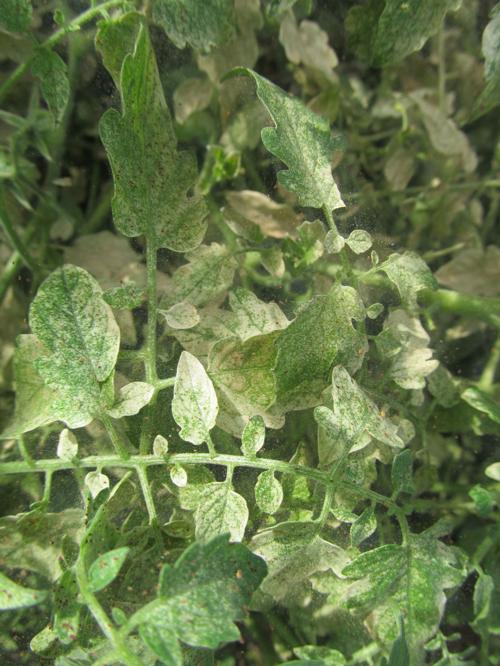Q: My tomatoes show an unknown leaf disease that has slowly spread over 35 percent of all tomato plants. Based on my observations, it started approximately four weeks ago within the center of one plant and has slowly advanced. Also, there is a very fine spider like web covering some of the browned leaf areas. I am familiar with “leaf curl” problems, but this is a new one for me.
A: From the photos and your description, I suspect spider mites. The symptom that is most noticeable is the color change on the leaves as a result of their feeding. Their tiny mouthparts pierce the leaves and remove sap. Just one mite feeding wouldn’t be noticeable but after weeks of feeding by a number of them, the change in leaf color becomes more noticeable. The fine spider-like webbing is a sign as well. Spider mites, just like many of their spider relatives, produce webbing where they live. This is also something that may go unnoticed with a small number of mites but becomes apparent with a significant population. Identifying mites often requires a 10X magnifier and it’s good to make sure you have live ones before spending time and money treating for them. Sometimes we only see the damage after they moved on. Spider mites thrive in our arid climate and can be a problem on a variety of plants. They aren’t all bad though, since some mites are predatory and feed on the pest mites. When they become a problem there are a few tactics you can use to manage them. Sprays of water, horticultural oil, or insecticidal soap are usually effective in reducing their numbers. Mites often hang out on the underside of leaves so sprays should be directed to contact them there. Make sure your plants are properly irrigated because stressed-out plants are less tolerant of their feeding damage. Spider mites sometimes become a problem after spraying insecticides. The reason is that their natural predators are often victims of insecticides and the mites are less susceptible. That is why less toxic chemicals, such as oils and soaps, are recommended over stronger products to spare the predators.
Peter L. Warren is the urban horticulture agent for the Pima County Cooperative Extension and the University of Arizona. Questions and photos may be emailed to tucsongardensage@gmail.com.





